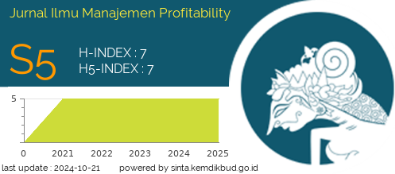The Effect Of Work Motivation, Spiritual Leadership, And Organizational Culture On The Work Achievement Of Yogyakarta Social Office Office Employees
Abstract
Keywords
Full Text:
PDFReferences
Adler, N. J., & Jelinek, M. (1986). Is "Organization Culture” Culture Bound? Human Resource Management, 25(1), 73–90.
Alimuddin, A. (2019). Kepemimpinan Spritual. Kelola: Journal of Islamic Education Management, 4(2), 159–170. https://doi.org/10.24256/kelola.v4i2.905
Boone, L. E., & Kurtz, D. L. (2002). Pengantar Bisnis. Jakarta: Erlangga.
Brahmasari, I. A., & Suprayetno, A. (2008). Pengaruh Motivasi Kerja, Kepemimpinan dan Budaya Organisasi Terhadap Kepuasan Kerja Karyawan serta Dampaknya pada Kinerja Perusahaan (Studi kasus pada PT. Pei Hai International Wiratama Indonesia). Jurnal Manajemen & Kewirausahaan, 10(2), 124–135. https://doi.org/10.36805/manajemen.v2i1.181
Fry, L. W. (2003). Toward a theory of spiritual leadership. Leadership Quarterly, 14(6), 693–727. https://doi.org/10.1016/j.leaqua.2003.09.001
Girsang, W. S. (2019). Pengaruh Budaya Organisasi dan Komitmen Terhadap Kinerja Karyawan RS Putri Hijau No. 17 Medan Wulan. AJIE - Asian Journal of Innovation and Enterpreneurship, 4(2), 159–170.
Hasibuan, M. (2002). Organisasi dan Motivasi. Jakarta: Bumi Aksara.
Juanita, S. M., Subiyanto, D., & Kurniawan, I. S. (2021). Pengaruh Motivasi dan Komitmen terhadap Prestasi Kerja Pegawai Dinas Perizinan dan Penanaman Modal Daerah Istimewa Yogyakarta (DPPM DIY). Journal Competency of Business, 5(1), 36–47.
Kakiay, A. N. (2017). Pengaruh Kepemimpinan Spiritual Dan Kepuasan Kerja Terhadap Kinerja Guru Performance. Jurnal Psikologi, 10(2), 148–151.
Kreitner, R., & Kinicki, A. (2014). Perilaku Organisasi (9th ed.). Jakarta: Salemba Empat.
Luhur, R. Y. (2014). Pengaruh Kepemimpinan, Motivasi Kerja Dan Lingkungan Kerja Terhadap Kinerja Karyawan Pada Biro Pengawasan Dan Pemeriksaan PT Bank Panin Tbk. Jurnal OE, VI(3), 327–344.
Ndraha, T. (2003). Teori Budaya Organisasi. Jakarta: PT Rineka Cipta.
Nowack, K. (2004). Does leadership practices affect a psychologically healthy workplace?
Paesal, A. A. (2021). Pengaruh Motivasi Terhadap Kinerja Karyawan Pada PT. PLN Parepare. Decision: Jurnal Ekonomi Dan Bisnis, 2(2), 171–176.
Poerwadarminta. (2004). Kamus Besar Bahasa Indonesia. Jakarta: Balai Pustaka.
Reksohadiprodjo, Sukanto, & Handoko, T. H. (2002). Organisasi Perusahaan (2nd ed.). Yogyakarta: BPFE.
Rismayadi, B., & Maemunah, M. (2016). Pengaruh Motivasi Kerja, Kepemimpinan dan Budaya Organisasi Terhadap Kepuasan Kerja Karyawan serta Dampaknya pada Kinerja Perusahaan (Studi kasus pada PT. Concord Indonesia). Jurnal Manajemen & Bisnis Kreatif, 2(1), 124–135. https://doi.org/10.36805/manajemen.v2i1.181
Riyadi, S. (2011). Pengaruh Kompensasi Finansial, Gaya Kepemimpinan, dan Motivasi Kerja Terhadap Kinerja Karyawan pada Perusahaan Manufaktur di Jawa Timur. Jurnal Manajemen Dan Kewirausahaan, 13(1). https://doi.org/10.9744/jmk.13.1.40-45
Robbins, S. P., & Judge, T. A. (2013). Organizational Behavior. Boston: Pearson.
Rondonuwu, J. Y., Areros, W. A., & Sambul, S. A. P. (2017). Pengaruh Kepemimpinan Spiritual terhadap Kinerja Karyawan Pada PT. Ciputra International Proyek City of Blessing Citraland Manado. Jurnal Administrasi Bisnis Unsrat, 5(6), 1–9.
Ryan, R. M., & Deci, E. L. (2000). Intrinsic and Extrinsic Motivations: Classic Definitions and New Directions. Contemporary Educational Psychology, 25(1), 54–67. https://doi.org/10.1006/ceps.1999.1020
Schein, E. H. (2004). Organizational Culture and Leadership. San Fransisco: Jossey-Bass.
Sedarmayanti. (2017). Pendekatan dalam penilaian prestasi kerja. Journal of Chemical Information and Modeling.
Siagian, S. (2002). Kiat Meningkatkan Produktivitas Kerja. Jakarta: Rineka Cipta.
Sinetar, M. (2001). Spiritual Intelligence, Kecerdasan Spiritual Belajar Dari Anak yang Mempunyai Kesadaran Dini. Jakarta: Elek Media Komputindo.
Stoner, J. A. F., Freeman, R. E., & Gilbert, D. R. (1995). Management. New Jersey: Prentice Hall, Inc.
Sulistyo, H. (2009). Analisis Kepemimpinan Spiritual Dan Komunikasi Organisasional Terhadap Kinerja Karyawan. Jurnal Ekonomi Dan Bisnis, 10(2), 311–321.
Suwandi, S. (2016). Pengaruh Budaya Organisasi terhadap Prestasi Kerja Karyawan melalui Kepuasan Kerja. Analitika: Jurnal Magister Psikologi UMA, 8(2), 140–147.
Suwati, Y. (2013). Pengaruh Kompensasi Dan Motivasi Kerja Terhadap Kinerja Karyawan Pada Pt. Tunas Hijau Samarinda. EJournal Ilmu Administrasi Bisnis, 1(1), 41–55.
Thoha, M. (2004). Perilaku Organisasi, Konsep Dasar dan Aplikasinya. Jakarta: Raja Grafindo Persada.
Tobroni. (2005). The Spiritual Leadership. Malang: UMM Press
DOI: https://doi.org/10.26618/profitability.v6i2.8457
Refbacks
- There are currently no refbacks.

Jurnal ilmu Manajemen Profitability Is Licenced Under a Creative Commons Attribution-NonCommercial-NoDerivatives 4.0 International License. Jl. Talasalapang No.20 A, Gn. Sari, Kec. Rappocini, Kota Makassar, Sulawesi Selatan 90221











1.png)